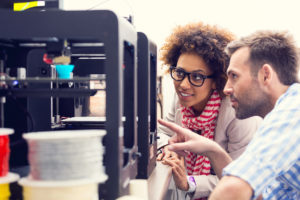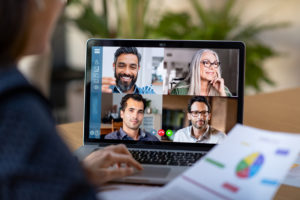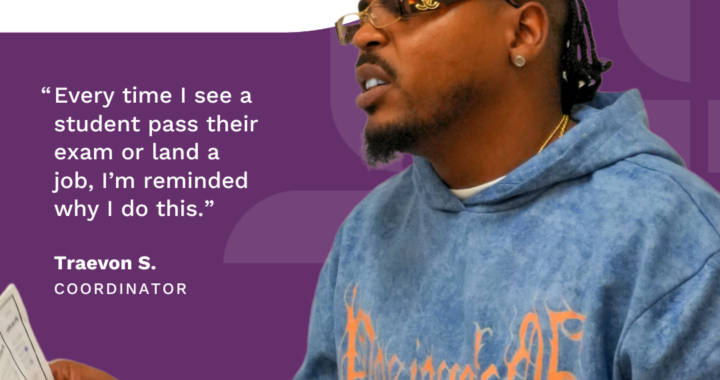By it admin
When COVID-19 struck, we were in the midst of what was acknowledged as the fourth Industrial Revolution – characterized by the blurring of the physical, digital, and biological worlds and the rapid adaptation of new technologies such as cloud computing, robotics, artificial intelligence, 3-D printing, and more.

Needless to say, COVID-19 has been an unexpected turn of events in our modern society. Education is being reimagined. Job opportunities are in dire need. National conventions are taking place digitally. We have grown to rely on technology and new skills for every facet of our lives, yet the playing field is still unfavorable to those who don’t have the opportunity or ability to participate in our current, hyper-digital world.
In 2019 at San Francisco Goodwill of San Francisco, San Mateo and Marin Counties (SF Goodwill), a nonprofit social enterprise that creates second chances through training and the dignity of work, we helped more than 3,600 people at our Career Centers gain skills and search for new job opportunities. We placed 463 of our trainees in positions at 229 Bay Area companies. We also employed more than 500 people ourselves – most of whom have multiple barriers to employment, including incarceration, military service, homelessness, immigration, or addiction. Our focus has always surrounded the future of work and extending these opportunities to folks who have been left behind. Now, more than ever, we encourage the Bay Area to do the same.
Today, as we simultaneously deal with a steep decline in job availability and leading headlines that credit the technology sector for increasing job availability in the Bay Area, we finally have an opportunity to level the playing field through job skill training and investments in our workforce. The future of work is now.
For the past several years SF Goodwill has prepared our employees and trainees for a workplace that will require very different skill sets and approaches than just a few scant years ago. Our proven track record of innovative programs and ideas to place people into new job opportunities has inspired us to keep going, especially during this time. Through our “earn while you learn” model, for example, 95 percent of employees who came to us had low or no income, and have since taken advantage of continual training in 21st-century skills that position them to move into higher-paying, sustainable jobs. When COVID-19 triggered an uncomfortable shift in our current economy and decimated jobs– especially jobs for vulnerable members of our community– we quickly shifted to a virtual model and now offer many of our training classes and career services in this form.
We believe the blueprint for returning people impacted by COVID-19 to the workforce, while also ensuring greater socio-economic equity, requires four factors: empowering a diverse workforce, developing a growth mindset and soft skills, training people from marginalized communities in updated technology skills, and working collaboratively with community partners.
Designing a more equitable and diverse job market
In an effort to diversify their own workforce and offer opportunities in an equitable and just manner, we encourage all businesses and organizations currently rehiring to reconsider the pool of applicants they once looked over. Meet people where they are, and dive into offering them training in the tools that the workplace will demand. According to “Diversity Matters”, a report by McKinsey & Company, a global management consulting firm, research has demonstrated that diversity is a competitive advantage directly correlated to increased profitability.
While businesses and organizations aim to fulfill that promise, we are committed to continuing to fulfill ours. Take the young man who came to Goodwill after a decade of incarceration and gang involvement and without a high school diploma. He immersed himself in our Google IT Analytics course and now manages more than 100 people as Goodwill’s director of logistics and transportation. We are proud to see our commitment to diversity and equitable opportunities pay off through this young man’s trajectory, and look forward to seeing this trend amongst many more San Francisco workers.
Developing a growth mindset and soft skills
While certainly needed, today’s workplace requires more than just teachable and transferable skills. More elusive, but equally important, are “soft skills,” which are traits such as critical thinking, collaboration, cross-cultural understanding, problem-solving, flexibility, adaptability, resilience, comfort with ambiguity, and empathy.
Anyone can learn to collect raw data, but unless they have these interpersonal skills and the ability to problem-solve, they won’t be able to work with teams to interpret and utilize that data. At SF Goodwill we work with our trainees and employees in developing a growth mindset muscle where employees are encouraged to constantly learn and flourish. According to an internal Google study that sought to understand what led to the most innovative and productive groups within the company, Google found that their highest performing teams were interdisciplinary groups that benefited heavily from employees who brought strong soft skills to the collaborative process. The study, dubbed “Project Aristotle”, proved that the best teams at Google exhibited a range of soft skills, including quality, generosity, curiosity toward the ideas of your teammates, empathy, and emotional intelligence.
Modern Technological Skills

SF Goodwill was born in response to the 1906 Earthquake crisis – We have turned crises into opportunities for over 100 years. As we move toward a more dynamic, virtual-based economy, the concept of job readiness will need to expand accordingly. Workers and job seekers will need to learn new skills, accumulate experience, and leverage that experience to find new work. Perhaps the technologies that will be most in-demand are artificial intelligence, machine learning, and data analytics, but like with many technologies, there is a huge access gap. Most of the equipment and training are available largely to the college-educated who are likely already in white-collar professions.
At SF Goodwill’s Microsoft Makerspace in our headquarters in the Tenderloin, we taught leading-edge skills to anyone who was curious and committed, and are in the process of determining how to continue this training in a post-COVID-19 world. We encourage organizations and businesses to increase access to training materials in order to level the tech playing field. Many of our partners, including Google.org, have long committed to this quota and offered their training to SF Goodwill participants. We encourage all other prominent platforms in San Francisco to do the same.
Community Partners
We are fortunate to be based in the Bay Area, the tech capital of the world. Now, more than ever, partnerships with the City of San Francisco, businesses, and other community nonprofits are critical.
In the years ahead, we are going to face many challenges in reviving the economy and bringing people back into the workforce. Let’s use this forced interruption to push the reset button. This is not the time for business as usual—we know that would leave too many people behind. We need a job market that works for everyone. It will require collaboration, fearless leadership, innovation, and significant investment in workforce development that is inclusive, equitable, future thinking, and bold.
San Francisco is where people have been flocking to for 170 years to remake their lives and start anew, and we have no doubt we can weather this storm in a way that benefits all San Franciscans through collaboration, innovation, and leadership.


